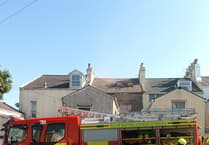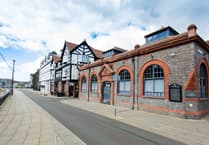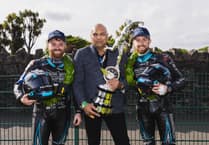The RNLI is highlighting the generations of families who help to keep the vital charity afloat through their volunteering and fundraising.
The Isle of Man is at the centre of this, being the place where Sir William Hilary established the Royal National Lifeboat Institution back in 1824. Its roots run deep through Manx families who have sacrificed precious time together in order to continue saving lives on the Irish Sea.
Port St Mary RNLI has the Keggen family.
A name well-known in the village because of their local businesses, including scuba diving holidays, building and construction as well as being the local funeral director. The family are not only on-call 24/7 for their jobs, but also as volunteers for the RNLI.
It started back on May 6, 1974 when father Michael joined Port St Mary Lifeboat. As someone keen on boats due to his love of scuba diving, he wished to get involved in the RNLI and give something back.
Over the years Michael has worked his way through the training, learning what was required to be crew, eventually becoming a navigator and a mechanic.
Michael is now the first Coxswain on the all-weather lifeboat ’Gough Ritchie 2’, dedicating 46 years of service to the RNLI so far.
His commitment and passion for the RNLI was clearly something which he passed on to his children, as in 1999 his daughter Sarah became the first female crew member at Port St Mary.
After being crew for six years, Sarah moved on to become deputy launch authority in 2017 and has been the lifeboat operations manager of Port St Mary since 2019.
It is a role well-suited to someone who has spent time as a lifeboat member and appreciates the challenges the crew face. Sarah’s younger brother, Thomas, also followed in the family footsteps by joining the crew in 2007.
Thomas focused on the D-Class in-shore lifeboat and was on the crew for 10 years before unfortunately, due to an injury, having to step down in 2017.
In total, the Keggen family have dedicated more than 65 years’ service to Port St Mary RNLI, and have sacrificed time together to brave the Irish Sea in all-weather to help save lives at sea.
Michael said: ’The RNLI is in my family and I’m proud that my children have carried on the family tradition.’
Sarah said she considers Port St Mary’s crew a second family: ’I’ve grown-up with it and stayed with it as they need volunteers and it’s a good thing to do for fundraising for the community as well.
’If people are thinking of joining, you don’t need any seafaring background as you get training given to you.
’The only thing we like to see in volunteers is enthusiasm and wanting to do something to help. People should join-up because it’s a great cause and it’s a community-spirited organisation.’
Sarah goes on to say: ’It’s been a challenging year, but one which reminds us how important family really is.
’However, we will remain on-call 24/7 and ready to respond to the sound of our pagers to make sure we are there for anyone who finds themselves in difficulty.’
The RNLI are always seeking new volunteers, which doesn’t always require people to get into a boat, as there are numerous volunteer opportunities in shore-based roles, such as station management, social media and particularly fundraising and organising events.
Throughout January, Port St Mary RNLI have responded to incidents involving a multi-emergency services call out on Marine Drive in Douglas, which involved a car driving off a cliff, and more recently a search on Sunday night (January 31) for a missing fishing boat.
Unfortunately, the global pandemic has hindered training and the number of volunteers joining up.
The charity is eager for people across the island to join stations.
Peter Cowin is a member of the Douglas crew and said teamwork is an essential part of being involved: ’We’ve not been able to do our training or have people travel from the UK to do the assessments.
’Peel RNLI have been hit more, as they’ve got a new boat, the ’Shannon’, which they couldn’t get on service.
’It got stopped in the middle of March last year, so they’ve had to work with the old boat for the last 12 months.
’As for training, we’ve picked up a few new recruits in Douglas.
’I think the ongoing process of training people seems to have ground to a halt, as they can’t travel to Poole. No one can go down, unless we isolate for two weeks.’
Peter said that it’s fairly common for families to be involved in the RNLI across the island, he himself having a son, Philip, involved who has joined the navy.
He said that the most rewarding part of being in the RNLI is to be part of a huge team, both on island and across the water: ’We’ve all got a common goal and work as part of a team. Because we’re all volunteers, we’re part of a RNLI family.
’There’s a camaraderie with the other emergency services as well - we all work as one and know some of the coastguards personally. The incident on Marine Drive is an example of that teamwork,’ he added.
The RNLI is independent of Coastguard and the government, relying on voluntary donations and legacies to maintain its rescue service.
Since it was founded, its lifeboat crews and lifeguards have saved over 142,700 lives.
Peter said that every person who has joined the charity has had their own reasons and that anyone who is considering joining will be rewarded for their efforts.
’A sense of achievement and doing some good in the community are some of the reasons why people join,’ he said.
’I know a chap who’s father died and he joined-up soon after that.
’Some people have walked-past stations and popped-in and joined.
’If you’ve got a little taste of spirit and adventure, there’s no reason why you can’t do it.’
JOIN UP
The RNLI recruits around 50,000 volunteers across the UK and operates more than 238 lifeboat stations in the UK and Ireland and, in a normal year, more than 240 lifeguard units on beaches around the UK and Channel Islands.
Douglas was one of the earliest places in the British Isles to be provided with a lifeboat, with one sent there in 1802.
It was one of the 31 boats built by Henry Greathead, builder of the first lifeboat stationed on the mouth of the Tyne in 1789. The Douglas boat was ordered by the Duke of Atholl.
Headquartered in Poole, Dorset, the RNLI has around 5,600 lifeboat volunteers, 3,500 volunteer shore crew, 180 lifeguards, and around 23,000 community fundraisers.
There are five lifeboat stations in the island - in Port St Mary, Port Erin, Douglas, Peel, and Ramsey.
To join as a volunteer, visit: https://rnli.org/support-us/volunteer, or turn up to any of the lifeboat stations.

.jpg?width=209&height=140&crop=209:145,smart&quality=75)



Comments
This article has no comments yet. Be the first to leave a comment.